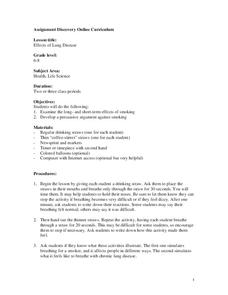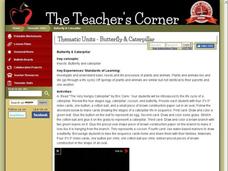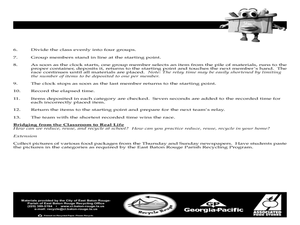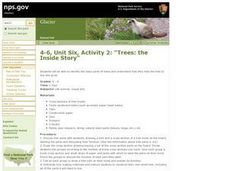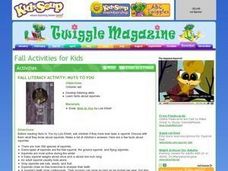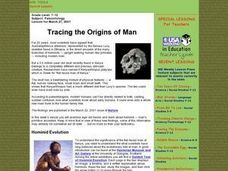Curated OER
Using a Dichotomous Key for Invertebrate Phyla
Students use a key to determine the phyla of invertebrates. They are broken into groups and each group gets a stack of pictures and uses the key to determine which phyla the animal belongs to. There are also individual questions for...
Curated OER
Effects of Lung Disease
Middle schoolers illustrate the chronic lung conditions associated with smoking and write a persuasive argument against smoking. In this lung disease lesson, students use straws and balloons to illustrate the problems created by smoking....
Curated OER
Leaf Patterns
First graders explore the existence of patterns in everyday items. In this science and math integrated lesson, 1st graders match leaves with a name word card and organize them into four patterns. This lesson includes a reading of And the...
Curated OER
Hollow Hilton
Students identify animals that depend on their environment for survival. They describe the relationship between living things. They draw or write an explanation of their findings.
Curated OER
Guided Reading "In the Night Sky"
Learners participate in a variety of reading exercises, such as choral reading and reading response journal, to reinforce concepts about space and nocturnal animals.
Curated OER
Butterfly and Caterpillar
Students listen to the story "The Very Hungry Caterpillar" and create their own "Very Hungry Caterpillar" book to learn the life cycle of a butterfly.
Curated OER
Exploring Limu Diversity
Young scholars explore limu diversity. In this ocean ecosystem activity, students classify limu according to its physical properties. Young scholars work in small groups to generate scientific observations and sort limu by characteristics.
Curated OER
Bird Feeders
Learners create environmentally friendly art. In this visual arts lesson, students follow the provided instructions to create hanging bird feeders.
Curated OER
The Sounds Of Nature
Second graders investigate the concept of sounds in nature. The sound of a coqui frog is used as an example. They identify species of frogs by listening to the sounds they make. Also, 2nd graders experience and identify other sounds of...
Curated OER
Habitat, What is That?
Young scholars explore animal habitats. In this environmental stewardship lesson, students match animals to their habitats in a classroom activity. Young scholars also observe a firefly habitat and read Fireflies. Students create...
Curated OER
Measure Up!
Students examine parallax and angular measurements. In this investigative lesson students calculate distances of objects and map their results.
Curated OER
Archimedes' Principle
Young scholars examine the relationship between density and buoyancy. In this physics lesson students use Archimedes' Principle to complete calculations on buoyancy and a lab activity.
Curated OER
Populations and Ecosystems
Sixth graders examine the factors that influence the stability of ecosystems. They construct a miniature ecosystem in a jar that includes plants, small fish, and snails, record the population changes over a period of four weeks, and...
Curated OER
Dunk It! Don't Junk It!
Third graders explore the concept of sorting recyclables. In this recycling lesson, 3rd graders determine how to separate recyclables from waste and how to sort recyclables into different categories.
Curated OER
Side by Side: Butterfly Wings and Symmetry
Students observe butterfly images and then draw and paint their own design. They use this activity to explain symmetry.
Curated OER
Hurricane
Students use children's literature in order to investigate the concept of hurricanes and how they occur. The metaphor is used to describe a play area that is magical. They use their imaginations and write about their favorite places to...
Curated OER
Trees: The Inside Story
Students explore trees. In this math lesson, students identify the basic parts of trees. Students create a model of a tree and label the parts.
Curated OER
Fall Literacy Activity: Nuts to you
Students actively listen to the book Nuts To You and learn facts about squirrels. In this squirrels lesson plan, students listen to the book, and discuss what they learned after.
Curated OER
Pop Bottle Terrarium
Students make terrariums out of bottles, pebbles, cuttings from other plants, and water. In this terrarium lesson plan, students learn about recycling by using household items to make terrariums.
Curated OER
Tracing the Origins of Man
Students discuss Hominid evolution through various websites and other resources. They examine online fossil skulls, discuss the use of tools by ancient man, and look for examples of sophisticated tools built by man.
Curated OER
Rain Stick
Pupils create a rain stick. In this rain stick lesson, students construct their rain stick using a cardboard tube, stickpins, a cup of rice, and decorative paper. Pupils follow given instructions and listen to...
Curated OER
Friction and Inertia
Learners study friction and inertia, make predictions, and compare data. In this investigative lesson students view a demonstration on friction, divide into groups, and complete an activity.
Curated OER
Transpiration
Students explore what affects the rate of transpiration in plants. They measure the rate of transpiration and analyze variables and additional factors that might slow or speed up the rate of transpiration.
Curated OER
C.S.I. on the Deep Reef
Students study chemotropic sybioses and chemotropic nutrition. In groups, they complete a Chemotrophic Species Investigations (CSI) Worksheet.



